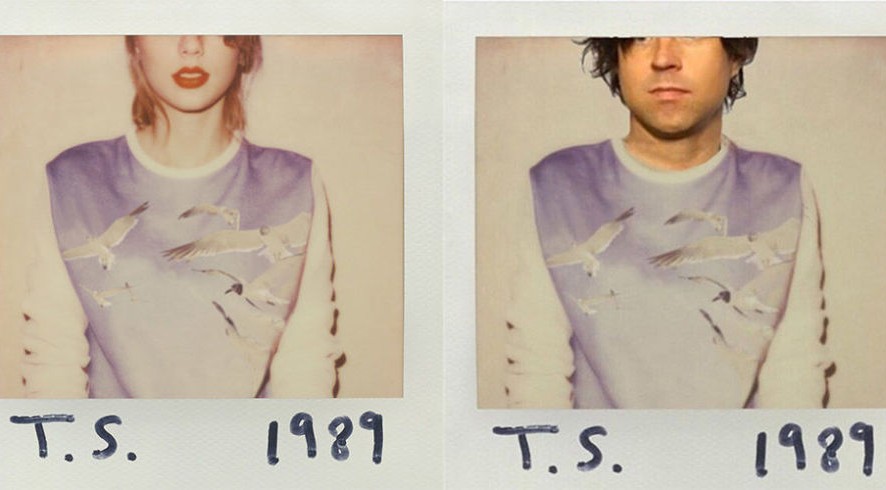Ryan Adams’ cover album of Taylor Swift’s 1989 has been out a few days now, and Adams is just getting around to all those slots on all those chat shows to support its release, standing up there in his denim jacket – seriously, does he not have other clothes? – being the serious indie rock’n’roll guy figure that we all know him to be. It is perhaps because of his reputation as ‘serious indie rocker’ that Adams’ cover album is garnering attention and reviews from sources that would, let’s face it, not give Swift’s original pop album the time of day, despite its overwhelming commercial success. In fact, Adams’ performance promoting 1989 on Trevor Noah’s The Daily Show, will be its first ever musical performance. I mean, they’re not even his songs.
Publications like The New Yorker and Pitchfork especially have graciously set aside the space for a review of 1989, whereas they have resolutely refused to cover any of Swift’s own albums, through a bid to keep up their “alternative” or “respectable” image. This is despite the fact that music critics, even some of Pitchfork’s own, have voiced their support for Swift’s music time and time again, even polling 1989 in their top 50 of best albums of 2014, in at number 31. It just didn’t actually ever get reviewed on its own.
Meanwhile, critics are rushing to claim that Adams’ version of Swift’s songs give them greater meaning because of their more obviously heart-breaking, or more overtly emotional sound. But Adams has not changed the lyrics – if you’re able to listen past the sunny synths in Swift’s songs, the heartbreak and disquiet is still very clear. The sadness is not however, more real in Adams’ version than Swift’s – just because he’s slowed down the songs and played them over some acoustic guitar. Swift’s album was already a masterpiece, but you may argue, if you will, that has made it an observable mournful masterpiece. But at its core, it’s still an album documenting Swift’s realisation that life may not turn out how she exactly pictured it, and that she can not rely on others for her happiness any more; this underlying theme throughout the album is always going to be leave a bitter undertone to the songs.
Let’s not pretend that this trend in honouring a male, guitar slinging musician for a cover of a piece of work by, typically, a female pop artist is something new. On a smaller scale, you only have to look at the comment section on any Radio 1 Live Lounge that fits this bill – Hozier’s ‘Problem’, Ben Howards’ ‘Call Me Maybe’ – to find people clamouring that it is ‘better than the original’ or ‘what real music sounds like’.
However, the point I am definitely not trying to make here is that Adams’ collection of songs is untalented or an attempt to rip off Swift. It’s very clear that Adams has a lot of admiration for the original, considers Swift a talented songwriter, and simply wanted to add his own interpretation to her songs. In fact, he wasn’t even going to release the album until Swift persuaded him otherwise, and she has, rather sagely, been very vocal in her support. The two artists have more common ground than you’d think, what with their public relationships and breakups – Adams recently divorced Mandy Moore – and Adams does find emotion in Swift’s songs, that’s for sure. He has at least made each song slightly different in style, which makes for an engaging interpretation, and makes it obvious that Adams is genuinely experimenting too, rather than just capitalising on Swift’s popularity. He’s making a real project of it.
Personally, my favourite song off Adams’ album is ‘All You Had To Do Was Stay’. I appreciate the jangly guitar, and the way he has taken the peppy chorus on Swift’s song and made it into a big vocal performance instead. ‘Style’ is transformed into a rocking, riffed up growl in places, and ‘Bad Blood’ is softened into a morose tale of betrayal rather than an amped up battle cry trying to disguise Swift’s vulnerability. ‘How You Get The Girl’ sounds positively haunted with Adams’ voice and the echo he’s added behind Swift’s words. There’s mellowness, a whisky warmth comfort to Adams’ album that was never going to be there in the original. It’s different – that’s all. Swift’s album is glittering tour de force of pop music, meticulously put together and perfectly arranged to create one of the most powerful albums of the past few years. Nothing is ever going to be able to touch this.
The problem is not in Adams at all. There is something new and interesting to be found in all of his covers, something that lends his album to being well worth a listen. The problem resides in people’s reception of Adams’ album over Swift’s. We need to focus on embracing pop and female artists for what they are. There is nothing wrong with appreciating every artist for what they have to offer.
Adams’ album has one advantage, however – it is, conveniently, on Spotify.
Heather Nash

